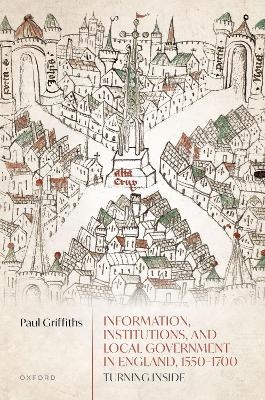
Information, Institutions, and Local Government in England, 1550-1700
Turning Inside
Seiten
2024
Oxford University Press (Verlag)
978-0-19-289626-1 (ISBN)
Oxford University Press (Verlag)
978-0-19-289626-1 (ISBN)
Investigates the reasons for and consequences of the wide-scale changes to the nature of local government in early modern England: a shift from 'open' to 'closed' management of a host of problems--from the representation of authority itself to treatment of every kind of local disorder, from petty crime and poverty to dirty streets.
The years between 1550 and 1700 saw significant changes in the nature and scope of local government: sophisticated information and intelligence systems were developed; magistrates came to rely more heavily on surveillance to inform 'good government'; and England's first nationwide system of incarceration was established within bridewells. But while these sizeable and lasting shifts have been well studied, less attention has been paid to the important characteristic that they shared: the 'turning inside' of the title. What was happening beneath this growth in activity was a shift from 'open' to 'closed' management of a host of problems--from the representation of authority itself to treatment of every kind of local disorder, from petty crime and poverty to dirty streets.
Information, Institutions, and Local Government in England, 1550-1700 explores the character and consequences of these changes for the first time. Drawing on wide-ranging archival research in 34 archives, the book examines the ways in which the notion of representing authority and ethics in public (including punishment) was increasingly called into question in early modern England, and how and why local government officials were involved in this. This 'turning inside' was encouraged by insistence on precision and clarity in broad bodies of knowledge, culture, and practice that had lasting impacts on governance, as well as a range of broader demographic, social, and economic changes that led to deeper poverty, thinner resources, more movement, and imagined or real crime-waves. In so doing, and by drawing on a diverse range of examples, the book offers important new perspectives on local government, visual representation, penal cultures, institutions, incarceration, and surveillance in the early modern period.
The years between 1550 and 1700 saw significant changes in the nature and scope of local government: sophisticated information and intelligence systems were developed; magistrates came to rely more heavily on surveillance to inform 'good government'; and England's first nationwide system of incarceration was established within bridewells. But while these sizeable and lasting shifts have been well studied, less attention has been paid to the important characteristic that they shared: the 'turning inside' of the title. What was happening beneath this growth in activity was a shift from 'open' to 'closed' management of a host of problems--from the representation of authority itself to treatment of every kind of local disorder, from petty crime and poverty to dirty streets.
Information, Institutions, and Local Government in England, 1550-1700 explores the character and consequences of these changes for the first time. Drawing on wide-ranging archival research in 34 archives, the book examines the ways in which the notion of representing authority and ethics in public (including punishment) was increasingly called into question in early modern England, and how and why local government officials were involved in this. This 'turning inside' was encouraged by insistence on precision and clarity in broad bodies of knowledge, culture, and practice that had lasting impacts on governance, as well as a range of broader demographic, social, and economic changes that led to deeper poverty, thinner resources, more movement, and imagined or real crime-waves. In so doing, and by drawing on a diverse range of examples, the book offers important new perspectives on local government, visual representation, penal cultures, institutions, incarceration, and surveillance in the early modern period.
Paul Griffiths is Professor of Early Modern British Cultural and Social History at Iowa State University. He is the author of Youth and Authority: Formative Experiences in England, 1560-1640 (OUP, 1996) and Lost Londons: Change, Crime, and Control in the Capital City, 1550-1660 (CUP, 2008). His Cambridge PhD was supervised by Keith Wrightson and he has also taught at the universities of Cambridge, Warwick, and Leicester. He has held National Humanities Centre and National Endowment of the Humanities fellowships.
Introduction
1: '(Mys)precyson'
2: 'Manifestaccon'
3: Punishment
4: Institutions
5: Information
6: Turning Inside
| Erscheinungsdatum | 02.03.2024 |
|---|---|
| Zusatzinfo | 16pp colour plate section and 6 black and white illustrations |
| Verlagsort | Oxford |
| Sprache | englisch |
| Maße | 164 x 241 mm |
| Gewicht | 818 g |
| Themenwelt | Geschichte ► Allgemeine Geschichte ► Neuzeit (bis 1918) |
| Geisteswissenschaften ► Geschichte ► Regional- / Ländergeschichte | |
| Geschichte ► Teilgebiete der Geschichte ► Kulturgeschichte | |
| Sozialwissenschaften ► Politik / Verwaltung ► Staat / Verwaltung | |
| ISBN-10 | 0-19-289626-1 / 0192896261 |
| ISBN-13 | 978-0-19-289626-1 / 9780192896261 |
| Zustand | Neuware |
| Informationen gemäß Produktsicherheitsverordnung (GPSR) | |
| Haben Sie eine Frage zum Produkt? |
Mehr entdecken
aus dem Bereich
aus dem Bereich
Giordano Bruno - ein ketzerisches Leben
Buch | Hardcover (2024)
C.H.Beck (Verlag)
29,90 €
das dramatische 16. Jahrhundert
Buch | Hardcover (2024)
Rowohlt Berlin (Verlag)
34,00 €


